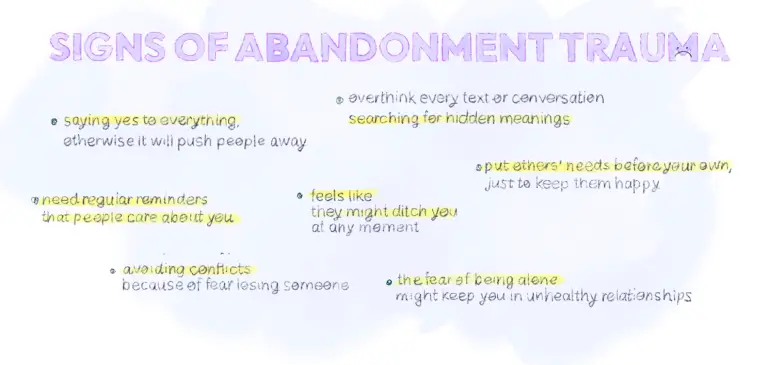Ever feel like your partner is packing their bags behind your back? Do you constantly need reassurance that they actually care and still love you? If you answer yes to all of these, these could be signs of abandonment trauma.
Feeling abandoned is a universal experience. It might be childhood emotional neglect, a parent who wasn’t always there, or a friend who disappeared.
Such experiences might leave a lasting mark, making us feel insecure, anxious, and desperate for reassurance in our adult relationships.
This article will break down what abandonment trauma is, why it happens, and how to move forward with healthier relationships.
Also, you can check if you feel a fear of abandonment with our quick “Do I have abandonment issues” test.
Key takeaways
- Abandonment trauma is a deep-seated fear of being left alone or rejected. It may arise from childhood experiences of neglect, loss, or emotional unavailability from caregivers.
- Abandonment issues are the behavioral or emotional responses that may develop as a result of abandonment trauma
- Common signs of abandonment trauma may include anxiety, insecurity, difficulty trusting others, and excessive need for reassurance.
- Healing involves understanding the root causes, challenging negative thoughts, practicing self-care, and seeking professional help if needed.
Abandonment trauma test: “Do I have abandonment issues?”
Instructions
Please read each statement carefully and rate your level of agreement using the following scale:
- Strongly disagree — 1
- Disagree — 2
- Neutral — 3
- Agree — 4
- Strongly agree — 5
- I feel anxious when I am in large groups of people, fearing that they might leave or forget about me.
- I often worry that my friends will eventually lose interest in me or find new friends.
- I have difficulty trusting romantic partners and often fear that they will leave me.
- I feel insecure in my family relationships, believing that they could abandon me at any time.
- I constantly worry about losing my job, fearing that I will be unable to support myself.
- I have a deep-seated fear of illness or injury, believing that it could lead to abandonment by loved ones.
- I find it difficult to adapt to change, as it often feels like a threat to my stability.
- I often feel anxious about being alone or left unattended
- I avoid expressing my needs or feelings because I fear being rejected
- I find it difficult to commit to long-term relationships or projects, fearing that I will be let down.
The results of “Do I have abandonment issues?” test
Note: This abandonment trauma test is intended for self-reflection and should not be used as a definitive diagnosis. If you are concerned about your mental health, it is recommended to consult with a qualified mental health professional.
Okay, time to count your score points, so let’s see how many of those statements you can relate to.
- 1-20: You likely have a low level of abandonment issues. You may experience occasional feelings of loneliness or insecurity, but these are generally manageable.
- 21-30: This score might mean that you may be experiencing mild to moderate abandonment issues. You might find it challenging to trust others or maintain long-term relationships at times. However, you can manage these feelings with healthy coping mechanisms.
- 31-40: If you scored high on this test, you are likely dealing with strong abandonment issues. These issues may significantly impact your relationships, self-esteem, and overall well-being. It’s important to seek professional help or support to address these challenges.
Now, let’s talk about the most common signals of abandonment issues and see if you can relate.
Symptoms of abandonment trauma
It is worth noticing that many abandonment trauma signs may overlap with signs of repressed childhood trauma. It’s the moment when you may ask yourself, “Why can’t I remember my childhood?”
Symptoms of abandonment trauma may include:
- Difficulty managing emotions. People with abandonment childhood trauma may experience hardship in regulating their emotions, leading to outbursts of anger, sadness, or being overly attached. They might struggle to express their needs healthily.
- Intense anxiety and worry. A constant fear of abandonment can manifest as generalized anxiety or social anxiety. You might worry excessively about loved ones leaving or situations that could lead to separation.
- Needing excessive validation or fearing being alone. There might be a strong need for constant reassurance of love and affection. The thought of being alone can be unbearable, leading to social anxiety or codependency in relationships.
- Struggling with self-esteem. This is a vivid symptom of enmeshment trauma as well. Abandonment trauma may damage a person’s sense of self-worth, leading to feelings of inadequacy and believing you are “not good enough” for love or connection.
- Feeling insecure and suspicious of others. Trusting others can be difficult due to past experiences. You might become suspicious of others’ motives or constantly seek signs of potential abandonment.
- Haunting memories or flashbacks. Vivid memories or flashbacks of the abandonment event can be intrusive and emotionally overwhelming.

Examples of childhood abandonment trauma in adults
Note that each person experiences everything differently. What one person has, another might not.
The most common examples of abandonment trauma may include:
- Destructive behavior. Despite wanting a deeper connection, you might withdraw emotionally when your partner gets close, pushing them away unconsciously.
- People-pleasing. An employee with people-pleasing tendencies might take on extra work or agree to unreasonable deadlines to avoid being seen as incompetent or replaceable. Also, the one with a fear of abandonment may also apologize excessively for almost everything.
- No fight in the house. Sweeping problems under the rug or avoiding difficult conversations to maintain a sense of harmony, even if it’s unhealthy.
- Looking for validation. If you have abandonment trauma, you might constantly seek approval from your friends, starting from a new bag to new relationships, often changing your opinions or behaviors to fit in.
- Dependence on others. You can’t make decisions without your partner’s input. You may rely heavily on your partner for emotional support, often feeling lost or insecure when they are apart.
- Overreacting. Sometimes, even small things, like your partner being unavailable for a bit, can trigger a wave of intense sadness, anger, or anxiety. It’s like your brain is on high alert for any sign of abandonment issues.
- Self-doubt. Maybe you struggle with low self-esteem and question whether you’re worthy of love. You might ask yourself, “Why do I feel so guilty?” believing you don’t deserve a happy relationship.
- Spacing out. If you have abandonment issues, during arguments or stressful moments, you might feel foggy, numb, or disconnected from the conversation. You find it challenging to stay present at the moment. You may wonder, “Do I have maladaptive daydreaming?”
What is abandonment trauma?
The trauma of abandonment is a complex emotional response stemming from experiences of neglect, rejection, or loss. These events can happen at any point in life but are often rooted in childhood trauma.
Imagine a little kid whose grown-up isn’t always around, is emotionally distant, or is just kind of unpredictable. That child might feel insecure and constantly worry about being left behind. Why? Because of such things as fundamental love, safety, and connection, needs aren’t always met.
For example, a child’s parent might struggle with substance abuse and is frequently unavailable, or perhaps the one goes through a difficult divorce and becomes emotionally withdrawn.
In such cases, kids may feel anxious and wonder if their parents actually love and need them. This is where abandonment issues come in.
Where does fear of abandonment come from?
The next important thing is to know the root of possible trauma. Abandonment trauma may come from a fear of loneliness, usually triggered by early experiences of loss or neglect.
These could be dramatic events or more subtle patterns of emotional unavailability from caregivers.
So, let’s answer your question, “Why do I have abandonment issues?” and take a look at the common causes of abandonment issues.
1. Childhood trauma
Our experiences in childhood can have a big significance on how we feel about relationships later in life. Sometimes, things that happened when we were young can make us worried about being left alone or abandoned. Here are a few examples of what might trigger those feelings:
- Abuse: You may ask, “Why do I have abandonment issues if I was never abandoned?” A kid who experiences physical or emotional abuse from a caregiver may develop a deep fear of being rejected or abandoned. The caregiver, who should be a source of comfort, becomes a source of anxiety and uncertainty. This makes it hard for the child to trust and build healthy relationships later in life.
- Neglect: When a child’s basic needs for food, shelter, or emotional connection are consistently ignored, it can lead to feelings of isolation and abandonment too. The child may feel unimportant and unlovable, creating a deep-seated fear of abandonment.
I’d like to add here the abandonment trauma quote from actor Sebastian Stan which reveals how trauma can affect our relationships: “If you’re getting abandoned, if you’re getting abuse as a child, if you’re getting uncertainty when you’re a child, unfortunately, you tend to look for that in your life later on, and you think that’s love.”
To see if you might have experienced childhood trauma, take our 28 Healing Childhood Trauma Plan. Gain valuable insights and discover if you have the signs.
2. Losing someone
The death or serious illness of someone you love can be a traumatic experience. It may trigger a fear of abandonment and a sense of powerlessness. You may worry that the remaining loved ones will also leave you, leading to anxiety and insecurity in future relationships.
3. Splitting up
Going through a breakup, divorce, or separation can also be a painful experience. It’s natural to feel a range of emotions, including sadness, anger, and maybe even anxiety. Sometimes, these experiences can make navigating new relationships feel a bit scary. This is because breakups can trigger fears of rejection or abandonment, even if the past relationship wasn’t ideal.
4. Emotional void
From childhood onward, we all crave love, safety, and the feeling that our emotions matter. But when those things are missing, it may leave a bit of a hole inside, making it hard to connect with others. It might even have some scars, like feeling abandoned and isolated.

What are abandonment issues?
Basically, abandonment issues are the long-lasting effects of unresolved trauma that have an impact on a person’s emotions, behavior, and thoughts.
You might also have an insecure attachment style, like becoming anxious when your partner is unavailable or far away or pushing people away for fear of getting hurt again.
This is where fear of abandonment may arise as a defense mechanism, a way to try and protect yourself from getting hurt again. This might look like needing more connection with people, which can lead to trust issues.
In a nutshell, attachment issues can be a root cause of abandonment issues. You may ask, “Ain’t it the same?” Nope, it’s not. So, let’s see the difference between these two.
Difference between abandonment and attachment issues
You may wonder, “Aren’t abandonment and attachment issues the same thing?”
Of course, they are closely related and may overlap. While both involve feelings of insecurity and fear, they have key differences.
Attachment issues are more rooted in early childhood experiences, particularly with primary caregivers. They are related to how someone learns to form bonds with others. Some of them might be fear of intimacy, jealousy, or an excessive need for approval.
Experience of abandonment in childhood can also contribute to attachment issues and to an anxious preoccupied attachment style.
This might arise from past experiences of feeling alone, unwanted, or unloved. One of some causes might be parent’s divorce, neglect, abuse, or daddy issues.
People with abandonment issues might be terrified of their partner leaving them, even if there’s no reason to believe that will happen.
The difference? Abandonment issues focus specifically on the fear of being left alone, while attachment issues concern how people form and maintain relationships. Both can make relationships tricky.
Types of abandonment issues
There are different types of abandonment experiences. Here are some of the most common ones:
- Physical absence: This can happen when a caregiver isn’t around to meet our basic needs for food, shelter, or healthcare.
- Emotional distance: Sometimes, parents are there physically but emotionally unavailable, leaving us feeling unseen or unheard.
- Rejection: Feeling like a caregiver favors someone else or simply doesn’t show appreciation can be hurtful.
- Sudden loss: Losing someone you love unexpectedly, through death or abandonment, can be deeply traumatic.
- Unpredictable situations: Even if needs are met, having a caregiver come and go due to struggles like addiction can create a sense of abandonment issue.
Remember, even without neglect, a lack of emotional connection can be damaging. If you
suspect you might be dealing with abandonment issues, a therapist can help you understand your experiences and develop healthy ways to cope.
How abandonment issues and trauma can affect your relationship?
People with abandonment issues may fear being left out or rejected in relationships. Things like separation, betrayal, unresolved trauma, or negative thoughts – this is what triggers abandonment issues.
This fear of abandonment may lead to clingy behavior, constant reassurance-seeking, or emotional distancing.
For example, a person with a fear of abandonment might constantly check their partner’s phone or accuse them of cheating, even when there’s no evidence.
Trauma, on the other hand, may create a sense of distrust and vulnerability. Someone with abandonment trauma may struggle to form deep connections or may become overly dependent on their partners.
Also, those who have experienced abandonment trauma may struggle with trust, intimacy, or expressing emotions. They might withdraw from their partner, become overly sensitive, or have difficulty regulating their emotions.
These issues can create a cycle of unhealthy behaviors and negative experiences, making it difficult to build and maintain healthy relationships.
How childhood abandonment trauma impacts adults
There’s a possibility that for some people, experiences of abandonment in childhood could lead to difficulties in adulthood.
Hannah Schlueter, MA, LAC, shared her thoughts about the impact of abandonment trauma, “The lasting effects of abandonment come with many intra and interpersonal challenges. Since the root of all attachment issues is the fear of rejection and abandonment, it is crucial to understand the way such experiences impact your ability to connect with others. Unresolved abandonment often results in more unstable moods, self-esteem, and relationships. Seeking out therapy and additional support to address attachment issues will lead to more effective communication skills, higher self-confidence, and increase your ability to seek out healthy relationships.”
It’s important to be sensitive to the fact that these experiences might be linked to mental health concerns, such as:
Independence vs. dependence. Trauma, particularly abandonment trauma, may trigger opposite coping mechanisms. Some people might feel a strong urge to be completely independent, wanting to take care of everything themselves (which might be a sign of parentification trauma). Others might lean heavily on others, fearing being left alone again.
For example, after a stressful job change, you might take on extra chores at home to feel productive or call your family more often for reassurance.
Being paranoid may lead to increased caution and a bit of jumpiness. While this extra awareness isn’t always comfortable, it can help us feel safer after feeling scared. For instance, after losing your keys once, you might double-check your pockets more often or put them in a specific place to avoid that worry.
Emotional distress. Abandonment trauma can make it harder to manage our feelings. We might feel down, hopeless, or even have thoughts of hurting ourselves.
Abandonment trauma and related conditions
When someone experiences abandonment, it can be difficult to manage emotions and feel safe. This can lead to struggles with mental health, such as anxiety or depression. Some people might even engage in self-harm or eating disorders.
These behaviors may be a way of trying to cope with the overwhelming feelings after abandonment.
Abandonment trauma can often co-occur with other mental health conditions, such as:
- Anxiety disorders: People with abandonment issues may be more likely to develop anxiety disorders, such as generalized anxiety disorder or social anxiety disorder. This is because they may constantly worry about being abandoned or rejected.
- Depression: Trauma can also lead to depression. People with a fear of abandonment may feel hopeless, worthless, and unlovable.
- Post-traumatic stress disorder (PTSD): In some cases, another related condition can be PTSD. This is a mental health condition that can develop after a person experiences a traumatic event.
- Attachment trauma: These are conditions that affect the way people form relationships with others. People with attachment disorders may have difficulty trusting others, forming close relationships, or maintaining healthy boundaries.
- Substance abuse: People with abandonment trauma may be more likely to abuse substances, such as alcohol or drugs, as a way to cope with their pain and emotional distress.
- Eating disorders: It can also be a risk factor for eating disorders. People with eating disorders may use food or control over food as a way to cope with their feelings of abandonment.
How to deal with the fear of abandonment
There is only one question left. How to overcome abandonment issues from childhood? Some approaches can help you manage abandonment trauma, such as how to heal childhood trauma without therapy or with the help of a professional.
But what you can do first by yourself is to identify what triggers your anxiety. Is it a partner working late or a friend becoming distant? Recognizing these situations helps you manage your emotions effectively.
- Challenge negative thoughts when abandonment fears arise. Replace them with realistic ideas. Instead of “They’re leaving me,” think, “They might be busy. We can talk later.”
- Practice self-care. Eat well, sleep enough, and exercise. Taking care of yourself builds resilience to anxiety.
- Set healthy boundaries. Know your limits and communicate them clearly.
If you’re struggling with abandonment issues, consider seeking professional help. A therapist can explore the root of your fears and teach healthy coping mechanisms.
Disclaimer
This article is for general informative and self-discovery purposes only. It should not replace expert guidance from professionals.
Any action you take in response to the information in this article, whether directly or indirectly, is solely your responsibility and is done at your own risk. Breeze content team and its mental health experts disclaim any liability, loss, or risk, personal, professional, or otherwise, which may result from the use and/or application of any content.
Always consult your doctor or other certified health practitioner with any medical questions or concerns
Breeze articles exclusively cite trusted sources, such as academic research institutions and medical associations, including research and studies from PubMed, ResearchGate, or similar databases. Examine our subject-matter editors and editorial process to see how we verify facts and maintain the accuracy, reliability, and trustworthiness of our material.
Was this article helpful?




